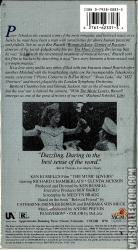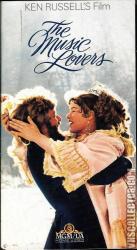The Music Lovers
Catalog Number
M202331
-
Primary Distributor (If not listed, select "OTHER")
Catalog Number
M202331
Primary Distributor (If not listed, select "OTHER")
Release Year
Country
N/A (NTSC)
N/A | N/A | N/A
N/A | N/A
The Music Lovers (1971)
Additional Information
Additional Information
Pyotr Ilyich Tchaikovsky is given the Ken Russell treatment in The Music Lovers, which means that there is plenty of music, plenty of passion, plenty of debauchery, and plenty of excess. Tame by Russell's later standards (Lisztomania), The Music Lovers nevertheless thrives on creative and sexual anguish. Richard Chamberlain plays Tchaikovsky with a bug-eyed intensity as a composer consumed by his art -- so consumed that his romantic attachments become bisexual and irrational. He falls in love with Nina (Glenda Jackson), the hysterical trollop he marries with dire consequences. As he explodes emotionally, his public performance of Piano Concerto in B flat minor becomes a cue for flashbacks to a series of discomforting childhood events that suggest incestuous relations with his sister. Back in real time, Tchaikovsky has to deal with Nina's outbursts while juggling his homosexual urges and his almost hidden desire for Count Anton Chiluvsky (Christopher Gable). The film also details the curious relationship between Tchaikovsky and his rich patroness, the middle-aged widow Madame Nadedja von Meck (Isabella Telezynska), who loves Tchaikovsky deeply, but refuses to meet him -- their only communication being through letters, even though he lives on her estate. Andre Previn and the London Symphony Orchestra perform Tchaikovsky's music.
he Music Lovers is a 1970 British drama film directed by Ken Russell. The screenplay by Melvyn Bragg, based on Beloved Friend, a collection of personal correspondence edited by Catherine Drinker Bowen and Barbara von Meck, focuses on the life and career of 19th century Russian composer Pyotr Ilyich Tchaikovsky. It was one of the director's biographical films about classical composers, which include Elgar (1962), Delius: Song of Summer (1968) and Mahler (1974), made from an often idiosyncratic standpoint.
The film received mostly bad reviews when it was released in the United States, but elsewhere has since become somewhat of a cult movie.[citation needed]
In his review in the New York Times, Vincent Canby stated,
“ Mr. Russell has told us a lot less about Tchaikovsky and his music than he has about himself as a filmmaker . . . [His] speculations are not as offensive as his frontal – and often absurd – attacks on the emotions. Richard Chamberlain . . . is fine as Tchaikovsky, looking a bit like a haunted faun, and Glenda Jackson is all sinewy nerves as Nina, but they are hard put to match the . . . nonstop hysteria of the production that surrounds them . . . I expect many people may look on The Music Lovers as an advance on the classical musical biographies turned out by Hollywood in the 1940s, but for all of its so-called frankness, there isn't much difference between this kind of sensational, souped-up popularization and the sort of pious, souped-down popularization that cast Cornel Wilde as Chopin and Robert Walker as Brahms.[1] ”
Roger Ebert of the Chicago Sun-Times called it "an involved and garish private fantasy" and "totally irresponsible as a film about, or inspired by, or parallel to, or bearing a vague resemblance to, Tchaikovsky, his life and times."[2]
Release Date: January 24, 1971
Time said, "Seventy-seven years have passed since Tchaikovsky's death. In this epoch of emancipated morality, it would be reasonable to expect that his life would be reviewed with fresh empathy. But no; the same malignant attitudinizing that might have been applied decades ago is still at work . . . [the film's] arch tableaux, its unstable amalgam of life and art, make it a director's picture . . . attempting to reveal psychology through music, Russell makes every character grotesque, every bar of music programmatic."[3]
Variety opined, "By unduly emphasizing the mad and the perverse in their biopic . . . producer-director Ken Russell and scripter Melvyn Bragg lose their audience. The result is a motion picture that is frequently dramatically and visually stunning but more often tedious and grotesque . . . Instead of a Russian tragedy, Russell seems more concerned with haunting the viewers' memory with shocking scenes and images. The opportunity to create a memorable and fluid portrait of the composer has been sacrificed for a musical Grand Guignol."[4]
In the Cleveland Press, Toni Mastroianni said, "The movies have treated composers notoriously badly but few films have been quite so awful as this pseudo-biography of Tchaikovsky."[5]
Dave Kehr of the Chicago Reader described the film as a "Ken Russell fantasia – musical biography as wet dream" and added, "[it] hangs together more successfully than his other similar efforts, thanks largely to a powerhouse performance by Glenda Jackson, one actress who can hold her own against Russell's excess."[6]
TV Guide calls it "a spurious biography of a great composer that is so filled with wretched excesses that one hardly knows where to begin . . . all the attendant surrealistic touches director Ken Russell has added take this out of the realm of plausibility and into the depths of cheap gossip."[7]
Time Out New York calls it "vulgar, excessive, melodramatic and self-indulgent . . . the drama is at fever pitch throughout . . . Chamberlain doesn't quite have the range required in the central role, though his keyboard skills are impressive."[8]
Pauline Kael would later say in an interview: "You really feel you should drive a stake through the heart of the man who made it. I mean it is so vile. It is so horrible."[9]
Release Date: January 24, 1971
Distrib: United Artists
he Music Lovers is a 1970 British drama film directed by Ken Russell. The screenplay by Melvyn Bragg, based on Beloved Friend, a collection of personal correspondence edited by Catherine Drinker Bowen and Barbara von Meck, focuses on the life and career of 19th century Russian composer Pyotr Ilyich Tchaikovsky. It was one of the director's biographical films about classical composers, which include Elgar (1962), Delius: Song of Summer (1968) and Mahler (1974), made from an often idiosyncratic standpoint.
The film received mostly bad reviews when it was released in the United States, but elsewhere has since become somewhat of a cult movie.[citation needed]
In his review in the New York Times, Vincent Canby stated,
“ Mr. Russell has told us a lot less about Tchaikovsky and his music than he has about himself as a filmmaker . . . [His] speculations are not as offensive as his frontal – and often absurd – attacks on the emotions. Richard Chamberlain . . . is fine as Tchaikovsky, looking a bit like a haunted faun, and Glenda Jackson is all sinewy nerves as Nina, but they are hard put to match the . . . nonstop hysteria of the production that surrounds them . . . I expect many people may look on The Music Lovers as an advance on the classical musical biographies turned out by Hollywood in the 1940s, but for all of its so-called frankness, there isn't much difference between this kind of sensational, souped-up popularization and the sort of pious, souped-down popularization that cast Cornel Wilde as Chopin and Robert Walker as Brahms.[1] ”
Roger Ebert of the Chicago Sun-Times called it "an involved and garish private fantasy" and "totally irresponsible as a film about, or inspired by, or parallel to, or bearing a vague resemblance to, Tchaikovsky, his life and times."[2]
Release Date: January 24, 1971
Time said, "Seventy-seven years have passed since Tchaikovsky's death. In this epoch of emancipated morality, it would be reasonable to expect that his life would be reviewed with fresh empathy. But no; the same malignant attitudinizing that might have been applied decades ago is still at work . . . [the film's] arch tableaux, its unstable amalgam of life and art, make it a director's picture . . . attempting to reveal psychology through music, Russell makes every character grotesque, every bar of music programmatic."[3]
Variety opined, "By unduly emphasizing the mad and the perverse in their biopic . . . producer-director Ken Russell and scripter Melvyn Bragg lose their audience. The result is a motion picture that is frequently dramatically and visually stunning but more often tedious and grotesque . . . Instead of a Russian tragedy, Russell seems more concerned with haunting the viewers' memory with shocking scenes and images. The opportunity to create a memorable and fluid portrait of the composer has been sacrificed for a musical Grand Guignol."[4]
In the Cleveland Press, Toni Mastroianni said, "The movies have treated composers notoriously badly but few films have been quite so awful as this pseudo-biography of Tchaikovsky."[5]
Dave Kehr of the Chicago Reader described the film as a "Ken Russell fantasia – musical biography as wet dream" and added, "[it] hangs together more successfully than his other similar efforts, thanks largely to a powerhouse performance by Glenda Jackson, one actress who can hold her own against Russell's excess."[6]
TV Guide calls it "a spurious biography of a great composer that is so filled with wretched excesses that one hardly knows where to begin . . . all the attendant surrealistic touches director Ken Russell has added take this out of the realm of plausibility and into the depths of cheap gossip."[7]
Time Out New York calls it "vulgar, excessive, melodramatic and self-indulgent . . . the drama is at fever pitch throughout . . . Chamberlain doesn't quite have the range required in the central role, though his keyboard skills are impressive."[8]
Pauline Kael would later say in an interview: "You really feel you should drive a stake through the heart of the man who made it. I mean it is so vile. It is so horrible."[9]
Release Date: January 24, 1971
Distrib: United Artists






Comments0
Login / Register to post comments